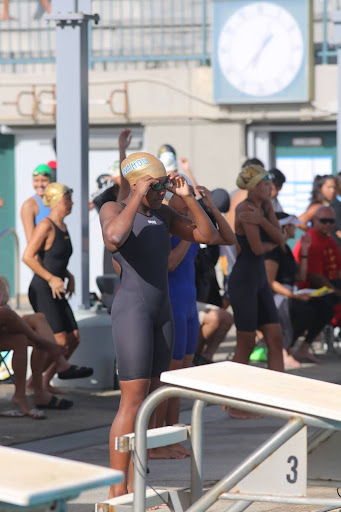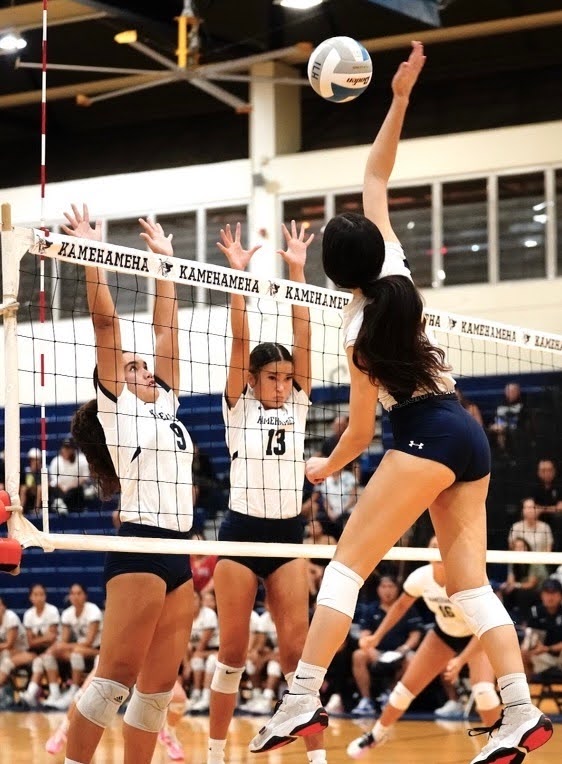It’s 4:00 pm. Synnove Robinson ‘26 puts on her cross country uniform and gets ready for practice. At 6:00 pm, practice is over, but she returns to the locker room to change into her swimsuit. The sun sets after one and a half hours of swim practice; she returns home around 8:00 pm. She types away at an essay due tonight and collapses into her bed. Tomorrow, she has morning swim practice, followed by a chemistry test.
Punahou’s athletic program is well-known all around the state and nation. It consistently dominates statewide and national championships, producing various collegiate and Olympic athletes, while offering over 140 teams and 21 sports. With 62% of the student body in grades 7-12 participating in sports, the athletic program is a nurturing environment for students who wish to grow as a learner in extension to the classroom setting.
However, behind their accomplishments in athletics, student athletes at Punahou face many challenges. Synnove Robinson ‘26, a varsity-level water polo player, cross country runner, and swimmer, reported struggles in managing her time efficiently amidst her busy schedule.
“The biggest challenge I face as a student athlete is balancing time with my classes and my sports,” said Robinson. “I go home, and I go to bed.”
Like Robinson ‘26, Haumea Marumoto ‘24 is a varsity volleyball outside hitter – the lead attacker of the team – who faces challenges regarding time management. Her weekly schedule is packed from Monday through Saturday, she explained.
“After school, we have practice from 4-6. On Mondays and Wednesdays, we have lifting at 3:45. We usually have games on Tuesday or Thursday nights or Saturday morning. If we don’t have a game on Saturday, we usually have practice in the morning. Sunday is our off day and I usually try to catch up on schoolwork.”
Journei Webster ‘26, varsity swimmer, reported that her schedule is packed. “I have either swimming or lifting in the mornings, and then I have my classes. After school, I have either ILH practice or Kamehameha Swim Club practices from 4 to 6:30. I usually have a 45-minute to an hour commute home.”
“When I go home I eat dinner and study or finish homework for my classes. Usually, on Saturday mornings I have morning practice from 7-10 with additional dryland training, then I catch up on homework. If I don’t have practice on Saturdays, I usually have swim meets all throughout the weekends,” said Webster ‘26. She too believes that her biggest challenge as a student athlete is time management.

With such a tight schedule filled with practices and games, student athletes are naturally required to be flexible with their academic work time.
“It’s hard to get school work done when I always have practice, games, or training,” said Marumoto ‘24. “I usually don’t have time to do my work until I get home at night.”
For many student athletes, they find snippets of time during the school day to tackle their academic workload.
“I usually do my work during school, in between classes and during my extra time, and sometimes I use my weekends to catch up,” said Robinson ‘26.
“I try to do as much homework as I can during the school day or in class so that I don’t have as much to do after school at home,” said Marumoto ‘24. “If I don’t have time to do my work during the week, I catch up on things usually on Sundays.”
Even with such meticulous multitasking methods, student athletes often find themselves with a pile of assignments and projects. In such cases where they cannot physically complete their coursework, student athletes reflected that they work closely with their coaches and teachers to find a solution.
“I’ve gotten extensions on assignments because I had swim meets during the week,” said Webster ‘26. “I’ve also gotten extensions ahead of time since I was expecting a busy week.”
“My teachers are usually very understanding and give me extensions on work if I need one,” Marumoto ‘24 said, similar to Webster ‘26. “My coaches also understand that school is important, so if we need to study for an important test or something like that then they’ll accommodate our needs.”
“Sometimes I have to skip practice to make time for assignments or projects,” Robinson ‘26 explained. “My coaches are usually pretty flexible with scheduling because they understand I have a lot of things to do.”
Being a Punahou student athlete is certainly a game of time management and mental discipline. However, despite the sacrifices and challenges it requires, all three student athletes – Marumoto ‘24, Robinson ‘26, and Webster ’26 – expressed their passion for their sport.
“I love swimming because I’ve done it for a really long time and because it has challenged me,” said Journei Webster ‘26.
For Marumoto ‘24, volleyball is her favorite sport because ”it’s fun, and it’s the only one I play.”
Out of the three sports that she plays, Robinson ‘26’s favorite sport is water polo; “It’s more of a team sport,” she said.
With discipline and passion, Punahou student athletes strive for athletic excellence. Their challenges serve as powerful lessons, strengthening their skills as athletes and self-directed learners – ones that will be carried on beyond their Punahou journey.

